Amon, Percussionist & Producer
Amon is a music producer and percussionist who has shared the stage with a wide range of internationally acclaimed artists. Known for his sizzling, West-African-fueled performances, he has recently been generating buzz with his group Analog Players Society.
[Update: APS has just released their new album Hurricane Season in Brooklyn, which you can listen to here.]
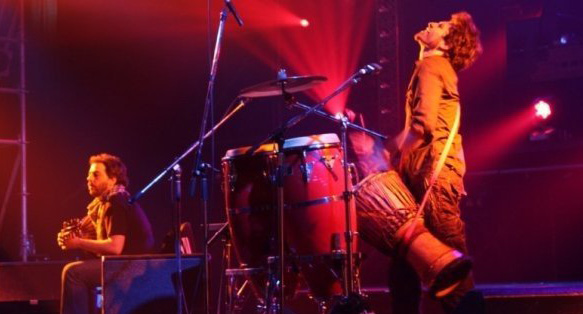
I’ve known Amon for a number of years, our friendship grew initially from us playing music together at various locals in NYC– Amon laying down intricate rhythmic phrases on djembe as my DJ partners and I played on the ones and twos.
We recently caught up at The Hook Studio in Brooklyn, where he is a partner and the head engineer, to discuss his creative evolution, his latest musical endeavors, and how he became the steward of a successful music studio.
How would you describe the music that you do?
It’s really a combination of the music that I love—Soul, Reggae, Afrobeat. I also have a great affection for New Orleans Second line. I like big dirty horns, and lots of drums.
Shit’s gotta be dirty, and represent Brooklyn! (laughs)
There are some great bands in Brooklyn and the greater NYC area that I think are in the same vein—horn sections, a sort of retro vibe, going more toward the analog sound….Budos Band, Chin Chin, Chico Mann, Antibalas.
Music that makes people shake what their mama gave them.
Tell us a bit about your background & early influences.
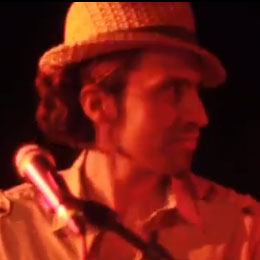 I was born in Dayton, Ohio. As a kid, before I could actually walk, I crawled over to the cabinet where my mom kept pots and pans and things. Apparently I had the manual dexterity to pick up a pot and I was banging on it, and I hit myself on the head with it. (laughter) Even afterwards I would crawl over and bang on it. That was my first drum…and my first drum did leave scars!
I was born in Dayton, Ohio. As a kid, before I could actually walk, I crawled over to the cabinet where my mom kept pots and pans and things. Apparently I had the manual dexterity to pick up a pot and I was banging on it, and I hit myself on the head with it. (laughter) Even afterwards I would crawl over and bang on it. That was my first drum…and my first drum did leave scars!
I played a drumset from the age of 9 to 19– I was in elementary school bands, and rock bands. When I was in college I met this guy named Stevie Blaha, who also played drumset, who nurtured my interest in hand percussion. He was a total hippie, and lived in Appalachia where I was going to school, he got me on this stage at the Casa Cantina, a tiny—but amazing—place in Athens, Ohio.
“Let the Music Play” – Analog Players Society
Everything changed there—I started playing hand percussion, I played with all these bluegrass and experimental bands, and that’s where I met Sxip Shirey as well. Sxip is a huge musician who is touring the world, playing with his band The Luminescent Orchestrii and Grammy winners like Rhiannon Giddens of the Carolina Chocolate drops.
Drum circles . . . they were the outlet that I had to play…but…I didn’t like them! They would be these random people who wouldn’t listen to each other. I was like, “Let’s DO something!”
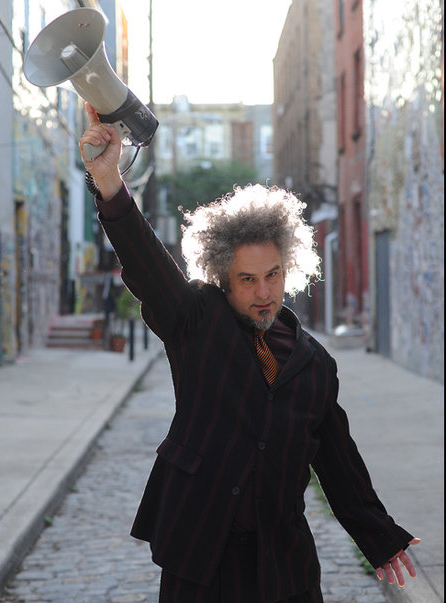
Sxip Shirey (Photo: Kyle Cassidy)
Sxip convinced me to drop out of school and go on a little tour with him, and basically go for music. He was the one who told me that if I was going to do music for a career I had to find some way to be unique. That was the most important thing—to find my thing.
At the time I was playing an old used timpani I had bought for $100, you know the kind that has a foot pedal on it. I would tilt it and play it with my hands while controlling the pitch with my foot, all the while doing stuff on stage with loops and samplers and stuff.
Sxip saw that and took me on the road. He introduced me to The Bindlestiff Family Cirkus, based out of Brooklyn, New York. I followed them around and hung out with them as much as I possibly could—I would meet them on their tour, and I’d play a show or two with Sxip. We would be the musical accompaniment for this circus sideshow burlesque vaudeville, real’ sexy fuckin’ circus, that was doing crazy shit in the middle of nowhere.
That’s all I did…for years. I trained. I guess I was late to training, but once I got to it I went as hard as I could.
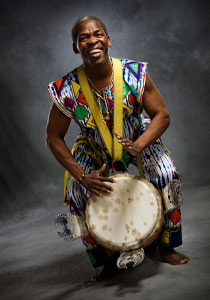
Mamady Keita
I spent a few years driving around a lot in the Southwest, following The Dead and Phish, being a hippie drummer, playing percussion but not really knowing what I was doing.
I was going for the drum circles—I was a hippie, man! (laughs) They were the outlet that I had to play…but…I didn’t like them! They would be these random people who wouldn’t listen to each other. I was like, “Let’s do something!”
I came across some people playing West African percussion, they were doing something incredible that I didn’t understand, and I wanted to figure that out.
Eventually I moved to Chicago…I needed to find a teacher! I didn’t want to be a fraud.
I went to the Old Town School of Folk Music, and I began studying West African percussion, which I did for four years. I became friends with this guy named Michael Taylor, who was my first teacher. I lived with him, he started me out and introduced me to all of my West African drum teachers– Michael Markus, M’Bemba Bangora, Famadou Konate and Mamady Keita, who I studied with for a while in Guinea.
For a few solid years it was drum classes, dance classes, Capoeira, coming home, and listening to Fela. That’s all I did…for years. I trained. I guess I was late to training, but once I got to it I went as hard as I could. I played a lot. This was in my early-to-mid-twenties.How were you making a living during that time?
At the time there were only three people in the greater Chicago area that were fixing djembes, and I was one of ‘em. I bartended for a while too, and worked at the school’s music store—and got free tuition for doing that! So I took and played at all these dance classes, which didn’t get me a lot of money but enough to live.
At the peak of my training I ended up playing a show with Tool, through a connection with my friend Gabriel Shaffer, who is a great artist. I got to go on stage and perform with them in a big stadium outside of Chicago, playing djembe.
Their drummer Danny Carey is a massively bad-ass drummer, and one of the nicest people I’ve ever met. Danny Carey’s name is usually spoken in the same breath as John Bonham, Billie Cobham, Buddy rich, Stewart Copeland and Steve Gadd.. he is a big influence of mine. During their Lateralus tour, Danny would go around to individual cities and find percussionists to play with them during “Triad,” which is a great number. I was lucky enough to be that one guy who got chosen to play with him.
It was cool—I played for 30,000 people, it was amazing. I walked on, and they dropped this big five-pointed star behind me, and the lights came on, and I just fuckin’ ripped it, I was scared to death, but I just went on with no fear for some reason. I hit the drum at first, and…you can’t see anyone out there, it’s like this dark haze, but when they react you hear it! It was an incredible experience.
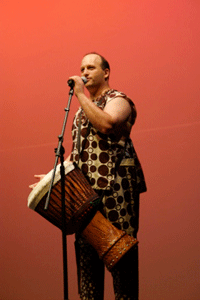
Michael Markus
It was in Chicago I met Mona [Amon’s wife, currently Marketing & Operations Director at Dubspot], we saw each other at West African shows, she was a singer…we started dating, fell in love, and within six months we moved to New York.
I went to work for Michael Markus. He was like, “Come, fix djembes!” I was in Magbana for a minute. Michael really set me up in NYC—he gave me work, opportunities to play, he introduced me to a lot of people.
I met Ben Moore through Michael’s class, and started playing percussion along with the DJs at his parties in the East Village, which is how you & I met.
Ben and I shared a love of music, he also produced events—in 2005 we ended up collaborating on producing the Willi B Summer Arts Festivale, which was a one-day festival in Williamsburg, Brooklyn, where I was living at the time.
We wanted to bring together all these creative people that we were into and have this big frickin’ party… I could also showcase what I’m passionate about, West African dance—we had a West African doundounba on the streets of Williamsburg, on North 6 street. It was amazing—the lineup was sick.
“Stone Soup” – Documentary of the Willi B Summer Arts Festivale by The New Pop
We featured more than 20 DJs and bands, 15 Theater & Dance companies. We had Si*Se, Dub Trio, Prince Paul, Ge-ology, Outernational, Luminescent Orchestrii, Dr. Israel, Maracatu, Romashka, Nation Beat, New York. Bastard Jazz represented with DRM and Jugoe, who is an old friend of mine. We also had fire dancers, live mural painting on the street, we had the neighboring venues involved in concerts and exhibiting fine arts. There were over 100 people involved in putting it together.
It was a grand experiment, to see if we could do it. And we did it!
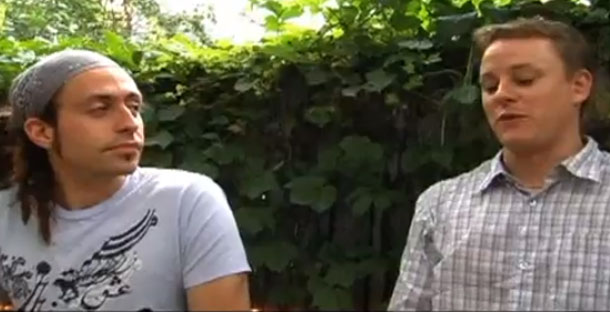
Amon & Ben Moore, Willi B Festivale Producers, circa 2006
Throughout it all I wanted to make sure that people knew that I was a percussionist first, that I just happened to be throwing this event so that I could hear and hang out with all these amazing musicians.
Willi B was my calling card to New York City, and what it did was introduce me to even more talented people, who I now work with. People like Chris Annibell, Nickodemus, Aaron [DRM] from Bastard Jazz.
After that I started playing with Chris Annibell at his Afrokinetic parties, first at Love and then at Miss Williamsburg, which should go down in history as one of the greatest New York venues, next to the Frying Pan in its heyday.
Afrokinetic – Video by The New Pop
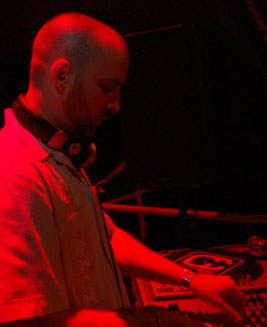
Chris Annibell (Photo: Lafotographeuse)
Can you talk about the dynamic between you and Chris as far as his DJing and your percussive accompaniment?
It’s all about communication. He was the first DJ I played with where he was listening to me as much as I was listening to him. He would tailor his sets for percussion.
In many different ways he would give me the cue, like, “Go—this is your break.” Or, “I’m going in this direction.” And that’s how we were able to pull off what we pulled off with some crazy breaks.
Chris is the King of the Faders, man! (laughs) The stab and the jab….he got used to my phrases, and I got used to his, and so we would communicate.
That’s how I approach my percussive accompaniment– every single track that anybody drops, am I adding something to this? Or am I taking something away by adding to it?
Did you guys ever practice together?
Nope. Not ever. It was completely freestyle every time. With him I never knew what was coming next. I got to know his music after a while, but the thing is, he’s always throwing in new stuff. With Chris and I, there’s an understanding that with the music he plays, I have a place to be.
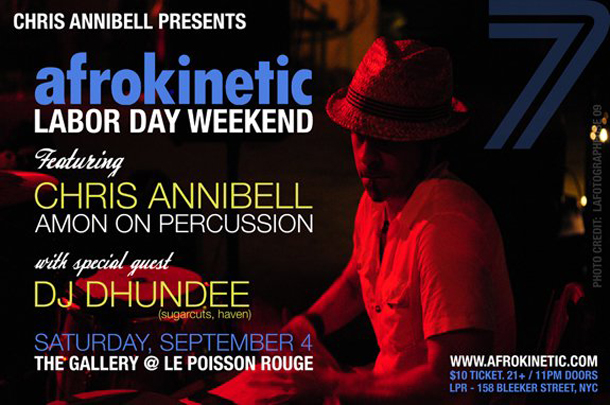
So, I found my way into being a percussionist who plays with DJs.
Where some percussionists who play along with DJs fail, is that they forget that the tracks that are being spun, that they’re playing along with, are fully finished pieces of music. They’ve got percussion in ‘em, they’ve got bass, they were mixed and mastered, they’re perfect by themselves—they don’t need your ass!
That’s how I approach my percussive accompaniment– every single track that a DJ drops, I ask myself a question. Am I adding something to this? Or am I taking something away by adding to it? There was an engineer for that track…that didn’t mix me in there! So I have to be in the pocket, or strike that balance by playing to the audience that is dancing in front of me, if they need what I do….
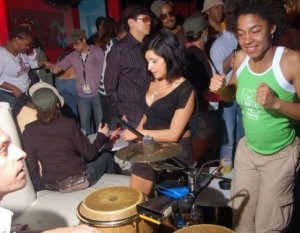 I approach the dancefloor like the djembefola do, as I was taught, that I work for the dancer—I work for the dancer completely. In West African drumming you give the people breaks that they can dance to, you guide them. Sometimes I will have to speak to a dancer by marking moves, but it has to be within the rhythm or the pocket of the song in which you’re playing.
I approach the dancefloor like the djembefola do, as I was taught, that I work for the dancer—I work for the dancer completely. In West African drumming you give the people breaks that they can dance to, you guide them. Sometimes I will have to speak to a dancer by marking moves, but it has to be within the rhythm or the pocket of the song in which you’re playing.
As a drummer I can also help the DJ, if they’re trying something that’s a little more experimental and the audience doesn’t know how to take it, I can throw in a couple phrases that ease them into the song.
In my travels and discovery of the worldwide House scene, I’ve only come across a handful of percussionists that approach playing with the DJ in a similar kind of way, such as Nappy G and Jimmy Lopez. Unfortunately, many people think that they can just pick up a drum and go, and don’t take the time to learn technique or how deep playing percussion can actually be.
Doing a folkloric, traditional kind of thing, like Guinean music, and then being part of the New York House scene, between those worlds, there’s enough diversity there and people do like to dance, and so the groups intermingle—and where they do is where I get to be more unique.
Are there certain styles of percussion or phrases that you find are particularly useful for a club environment?
Oh absolutely! I’ve got my bag! (grins)
Without giving away the keys to the kingdom, there are a lot of 4/4 accompaniment phrases, traditional rhythms from Guinea—Koo Koo, Kasa, Sinte, that are fantastic to use in House, in Reggae…a lot of 4/4 music. It’s all in how you phrase things, and what you don’t play.
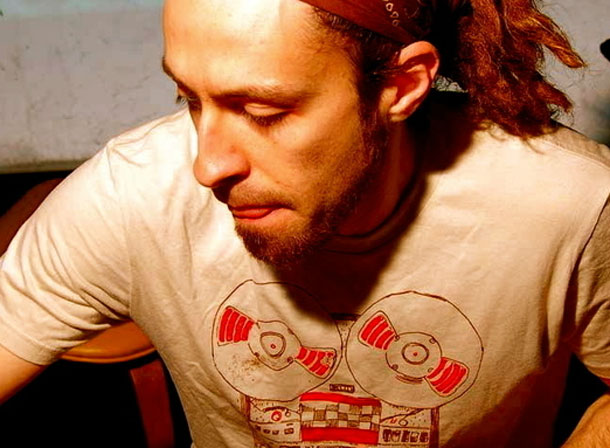
Once you get to a certain fluency in your playing you can come up with unlimited variations, you can speak that language. I can take one idea, and speak that in the music.
…and the music will tell you what’s about to happen. People are like, “How’d you hit that break? You must have known the song,” but 99% of the time I don’t know what’s coming, the music will tell you what’s going to happen—you can hear a pre-chorus, you can hear the bass line about to resolve. If you know House or Hip Hop, you know that every 16 or 24 bars something’s going to happen.
I try to approach being a percussionist with a DJ with very strong intent. I’m trying to add something to it without getting in the way. Which I think isn’t on enough people’s minds. “Are you making this better,” you know?
Same thing with covers or remixes—with Analog Players Society, am I going to present this in a way that is as good or better than the original.
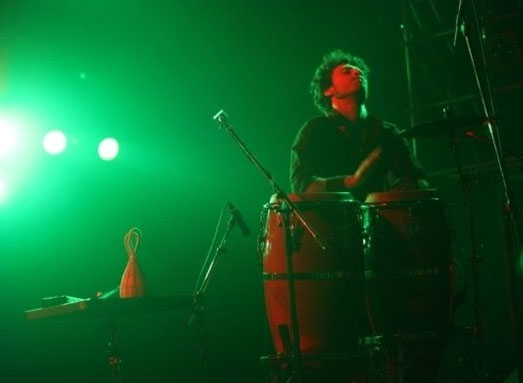
In addition to being a resident percussionist at Afrokinetic, you’ve also played gigs all over the country with a bunch of other DJs and musicians—Nickodemus [Turntables on the Hudson], Rich Medina, the Bastard Jazz and Raw Fusion crews, Jeremy Sole and DJ Wiseacre and The Lift…you played a concert with Zeb in Tokyo…where do you stand these days with groups like Magbana and the traditional stuff?
Everything works in waves—for a while I’ll work with Michael, for a while I’ll play with Afrokinetic, for a while I’ll hang out with Nickodemus, for a while I’ll be here at The Hook Studio. It’s all about surviving in New York City and taking the next available gig.
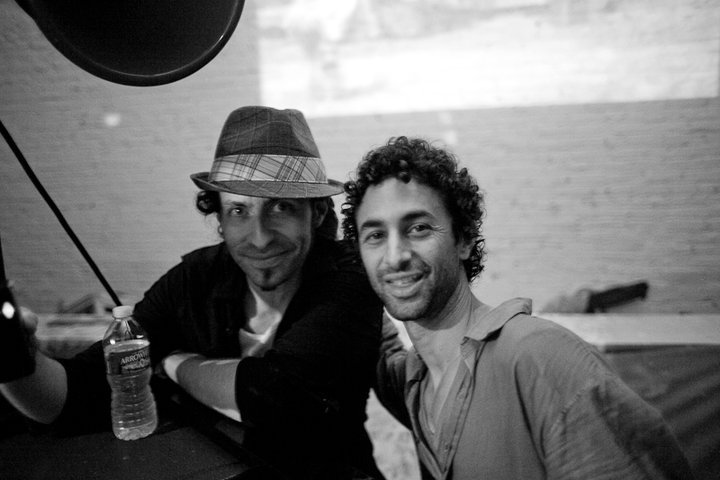
Amon & Nickodemus
Doing a folkloric, traditional kind of thing, like Guinean music, and then being part of the New York House scene, between those worlds, there’s enough diversity there and people do like to dance, and so the groups intermingle—and where they do is where I get to be more unique.
Michael Markus, Chris Annibell, Nickodemus…Pete Fand, who brought me into The Hook…those 4 people essentially introduced me to everyone in the city. I got to play with everybody. I went to Japan with Zeb, who I met through Nico, I got introduced to amazing DJs like Rich Medina through Chris.
I feel lucky to have played with some of the greatest DJs and musicians on the planet. There are more out there, but…I’m very lucky!
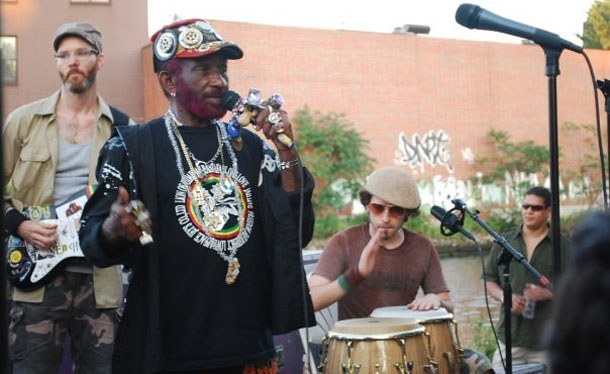
Amon playing with the legendary upsetter Lee "Scratch" Perry
Aside from the percussive accompaniment, I remember seeing you perform your own music on stage years ago, mixing samples in real time and then playing percussion over it…
(laughs) Oh yeah, as Ertal Dawg! It was somewhat esoteric…
Can you plot a course from that, to where you are now with Analog Players Society?
All of the projects have been shaped by the technology at hand. My first music, that I made with a four-track, it was hippie, and then I started using the ASRX sampler, which I used in my early days of being in a trip-hop band. Then I got Logic, and it started evolving as I was listening to house music and Trip Hop.
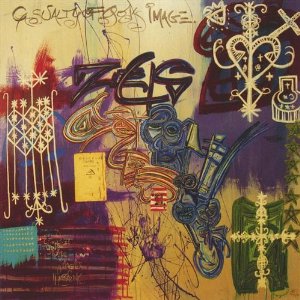 What was your creative goal with your early solo music?
What was your creative goal with your early solo music?
I was very influenced by Tom Waits, his Bone Machine album, and also DJ Shadow….somewhere between those two! I was also listening to a lot of Miles Davis.
I was doing a lot of stuff with samples, which was cool, but I started feeling like I was losing my musicianship, so what I wanted to do was write music. And I wanted to use real instruments. But to do that…I couldn’t afford my own studio.
I felt that if I was going to produce music I really needed to know what I was doing. I had started off in Studio Eleven in Chicago, learning on my own little rig there, but when it was when I connected with Pete that I really got down to business and started learning the way of the analog studio—compressors, mic placement, staying up late reading shit, talking to and watching other engineers.
 So Analog Players Society is the result of my environment, of the technology at hand—now I have this state-of-the-art technology of the 1970s, and I have all of these amazing session players come through. That’s what they do—they make their entire living touring the world, doing recordings, “learn 8 songs in a night” type of shit.
So Analog Players Society is the result of my environment, of the technology at hand—now I have this state-of-the-art technology of the 1970s, and I have all of these amazing session players come through. That’s what they do—they make their entire living touring the world, doing recordings, “learn 8 songs in a night” type of shit.
So I come up with song ideas, I use Logic to lay out a sketch, I play MIDI instruments and lay down a drum track, and then we play it live and record it. We do as much live as we possibly can.
I’ll usually save my percussion for the multi-track, because I’m usually behind the board as we’re tracking, and giving notes—although these guys are such pros, that they need very little direction—I’m really just steering them toward what I’m looking for.
So would you say that APS is essentially you, with a rotating cast of musicians, as opposed to a set band or ensemble?
Let’s just say that I would be lucky to have those guys as permanent band members. They’re amazing players and always doing a ton of different things.
Two of my biggest collaborators have been Shawn “Tricky” Dixson, one of the greatest session drummers in the city, and Ethan White of Tortured Soul, who is an amazing piano player and somehow just always knows what I want to hear. He was a partner in the studio as well. He has since moved down to New Orleans with his beautiful and talented wife, Tarrah Reynolds.
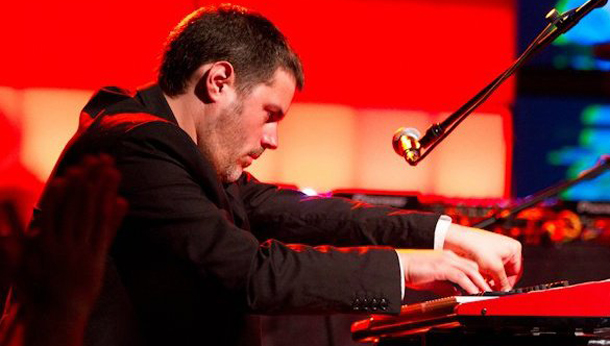
Ethan White
Ideally I want to be able to go to other cities with a core group and a set of tunes—a combination of standards and my own compositions—show up, enlist some additional pro session players in that city, rehearse for a couple of days, and have it be its own thing for that specific city…its own thing in LA, its own thing in Chicago, in Berlin, etc.
On “I Can’t Wait” it’s Cecilia Stalin— you probably remember her from work she did with Koop. She is a trained jazz singer and a teacher—her voice is like butter!
“I Can’t Wait” – Analog Players Society
(Exclusive teaser – watch out for the full track available on RedBud Records this Fall)
I remember you sustained an injury a few years back that impaired your ability to play gigs for a while—what effect did that have on your playing and your overall creative output?
In 2007 I was playing a ton of gigs, and also had my own sound company, Studio Brooklyn, renting DJ and live sound equipment. So I was perpetually schlepping a lot of equipment around, setting it up, tearing it down, and doing gigs where I was playing for like 5 hours straight. I was also in the studio, on the computer.
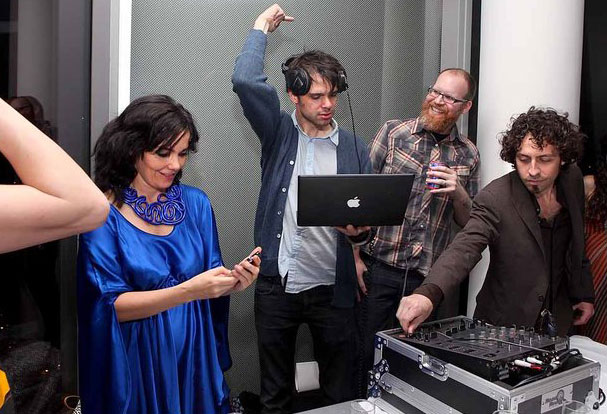
Studio Brooklyn holding it down for Björk
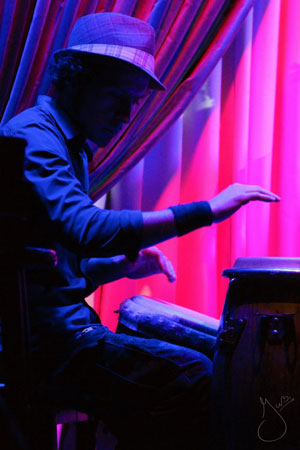 I ended up getting tendonitis in my arm, which set me down for about 8 months. Laura Mirabella, my friend and massage therapist, put me through some excruciating, restorative deep tissue massage, and some physical therapy, I got back…I still have to manage it, but I’m back. And you know, my hand stopped moving but I never stopped thinking about playing.
I ended up getting tendonitis in my arm, which set me down for about 8 months. Laura Mirabella, my friend and massage therapist, put me through some excruciating, restorative deep tissue massage, and some physical therapy, I got back…I still have to manage it, but I’m back. And you know, my hand stopped moving but I never stopped thinking about playing.
It was hard because I physically changed during that time—I went from being in great physical shape, working out, playing gigs, to losing about 10-15 pounds of muscle and not even being able to tie my shoes! I’m still getting back!
I think I came back a little more seasoned. Now I play what I need to play, instead of what I can, you know what I mean?
During that time I really threw myself into the studio stuff, running sessions with my left hand, and trying to come up with another way to keep going.
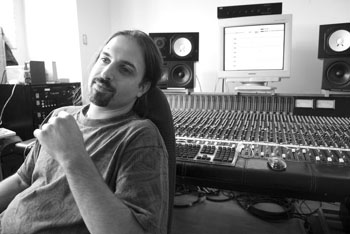
Peter Fand
I had met Pete Fand in 2008—Pete is the reason I’m here (gestures around studio). He brought me into The Hook Studio.
Pete gave me the keys to the kingdom—he gave me all of this. What I did for Pete, was I had the energy to come in here and learn this console and all this vintage gear, and fix and rewire stuff, and paint. He is an incredibly busy man, balancing family and Cirque du Soleil, among many other things.
He taught me a lot, gave me an opportunity, and I just ran with it, turned The Hook studio into a business. I am shepherding the studio until Pete’s return from Cirque du Soleil. It’s a good trade. Also, I’m constantly rehabbing his vintage gear, so it’s perpetually gaining in value.
How would you describe what you have going on here at The Hook Studio?
The people that we’ve had come in here in the last year, it’s been amazing.
We’ve had Horace Andy, Junior Reid, Afrika Bambataa, Sadat X, Blitz the Ambassador, Brother Culture, Les Nubian, Pharoah Monch, Cirque de Soleil, just to name a few.
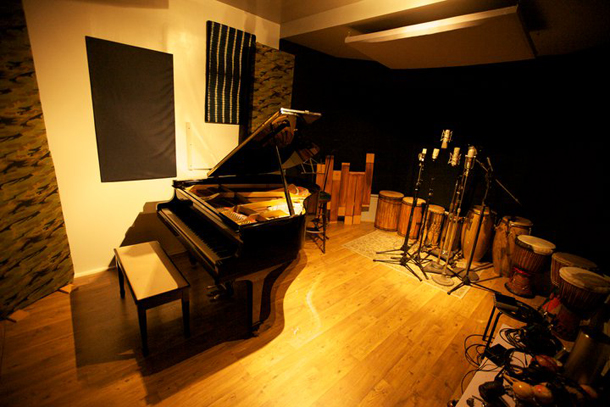
Why do people pick The Hook?
The vibe—it’s not pretentious…and we have great gear. This is a fantastic tracking studio. This is where we do the nitty gritty hard work of making an album. We order Chinese food, and get down & dirty in the studio. We have a vintage mic collection, and vintage gear, which I work painstakingly to maintain.
How do you find the time to do all that maintenance, on top of engineering and running the studio?
You just have to do it. That’s why it’s taken me so long to release 4 songs—I have to pay the rent, I’m running this entire place and maintaining the gear, I have to keep the clients coming in. It took a lot of time to learn, you know, working an old patch bay, troubleshooting “why doesn’t this channel work right now”
This mixing board is a legendary model. It’s a Harrison 4032. The EQ module in this is the same make as the one that they used on Thriller. …and it’s a bitch to keep working! (laughs)
I enjoy being an engineer and capturing sound.
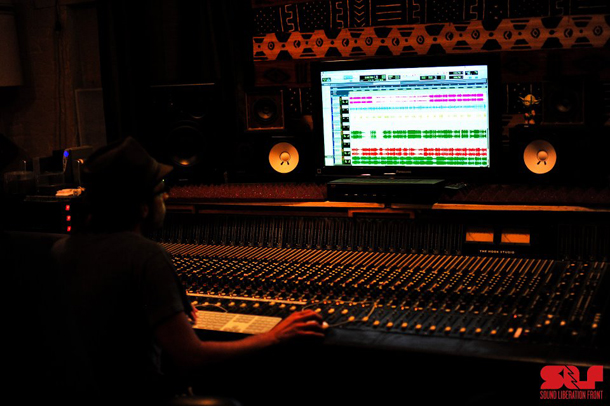
What do you think are some of the traits essential to running a successful studio?
Patience! (laughs) …and a true love of music and the creative process. Being able to detach from reality…that you’ll actually make money! (laughter) A willingness to learn…you have to stay ahead of the new technology coming out. For me it was all about learning something by throwing myself into it. Figure it out, or fail, basically.
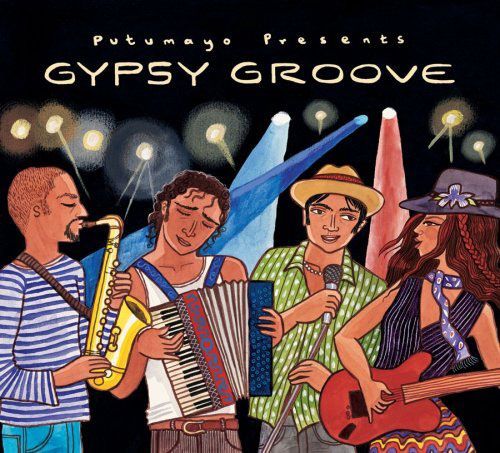 You’ve also done production work for Putumayo, right?
You’ve also done production work for Putumayo, right?
Yes! For a while Pete Fand and I were sort of the on-spec guys for Putumayo. Pete and I have a great rolodex of amazing musicians and singers from all over the world.
Is it difficult to make ends meet, doing that kind of work?
Oh absolutely! That’s just why you have to be really good! (laughs) If you’re going to do something on-spec, you just have to knock it out of the park. You gotta go for it, and we pay all the musicians to do their thing and we never know if it’s going to make it or not. But…we’d built up a reputation, I’d sold 3-4 tracks to them. They know that if they get something it’s not going to be total shit. Honestly, with them it’s “yay” or “nay” within the first 30 seconds anyway. That’s the game.
So there’s the risk that you’ll spend a lot of money producing a track, and it won’t get picked up….and then you just have to cut your losses?
Absolutely.
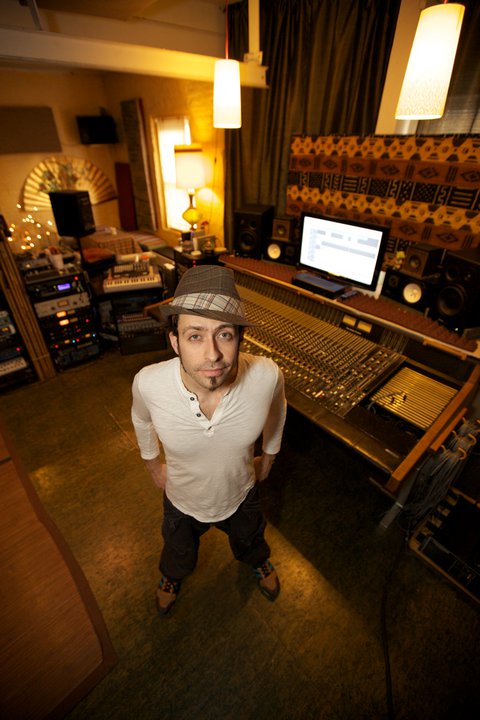 How do you balance your personal music projects with the demands of running a professional studio?
How do you balance your personal music projects with the demands of running a professional studio?
I don’t! (laughs) I’ll get back to you on that.
Are there any recent or upcoming projects that you’re excited about?
Analog Players Society, we have a whole album’s worth of stuff, and an incredible 45-minute set. There are also some remixes of my tracks in the works.
There will be some collaborations with Mark de Clive-Lowe, Ethan White from Tortured Soul. I’d also just like to say that I’m excited to work with Chicus from RedBud Records. He has been extraordinarily enthusiastic and excited about my new musical direction and is an incredibly generous person.
In regards to the studio, there are a lot of albums either out or coming out that we’ve recorded here—Blitz the Ambassador, big up, he recorded his album here. Check out an album coming out soon by Mariella. Bastard Jazz is coming in to record as well. Nickodemus has also tracked some of his new album here.
There are going to be multiple releases from Analog Players Society from now until the holidays…we’re droppin’ a series of 7 inches on RedBud Records.
[Update: APS has just released their new album Hurricane Season in Brooklyn, which you can listen to here.]
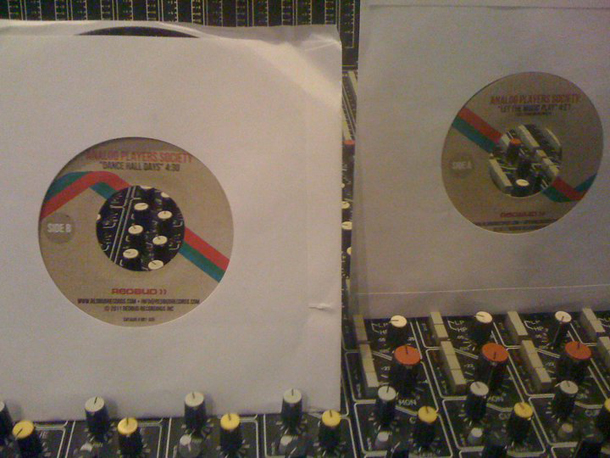
Where would you like to take that? Would you like to do more live shows?
Absolutely, live shows. We’ve got a wicked 45-minute set that will leave you dancing on the ceiling.
One thing that’s great about working with these guys is that they are total pros—they really know their shit. Not only do they nail their parts, but they make every show a little different.
Look out for us doing a show in November.
I’m also releasing some tracks under Amon Drum.
How do you differentiate the two?
Analog Players Society, everything you hear, there are no samples, no electronics, no MIDI…it’s real. I wouldn’t necessarily call it organic, it’s electric.
Amon Drum stuff, it can be anything—mash-ups, electronic music.
DJ MAM of Brazil amps up the crowd in Lyon, France with Amon’s remix of Nation Beat’s “Maré Cheia.”
Analog Players Society is “what happens when the lights go out.” A jazz trio can operate without any power….in the middle of the club, if we lose power, and the system goes out, and there’s a whole bunch of people, and you still want to make them dance, who’s left? You’ve got drums, you’ve got a piano, a stand-up bass…you can get rugged and raw with shit, without any power! APS is live music.
…and with Analog Players Society I like doing weird versions of a new form of standards. With jazz, it’s mostly straight-up covers, what we call standards. Well, I think there’s a whole lineage of awesome pop tunes from the 1980s and perhaps into the ‘90s, that deserve to be part of our “new standards.”
I love it that you’ve been covering all of this 80s freestyle—“I can’t wait,” “Let the Music Play”….
Yeah! “Dancehall Days” by Wang Chung.
“Dancehall Days” – Analog Players Society
What direction would you like to go in with your music and your creative development?
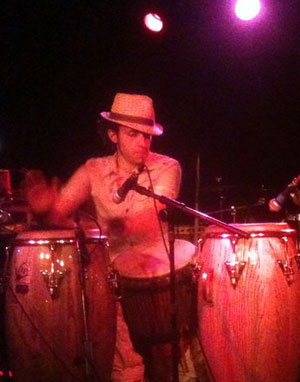 Really, I just want to keep writing songs and playing more live shows with live musicians, in multiple formats.
Really, I just want to keep writing songs and playing more live shows with live musicians, in multiple formats.
Also, producing great acts and talented musicians in The Hook Studio. I want to run a studio that continues to put out great music. Good music in, even better music out!…and continuing to pay the rent, that would be nice! (laughs)
[Update: APS has just released their new album Hurricane Season in Brooklyn, which you can listen to here.]
Keep up with Amon at Studiobrooklyn.net
Get the best in vintage analog warmth at The Hook Studio.





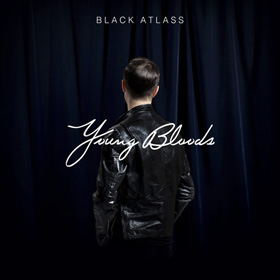

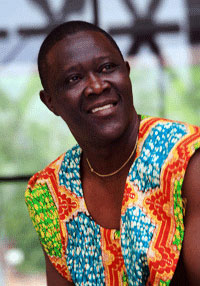

1,010 Comments
I remember Casa in Athens like it was yesterday. It was there I first really knew for sure that Amon was more than special. I think alot of others did too. I was there, too, when he walked on stage in front of Danny with Tool – wow. He played and the place roared. He is and always has been a Jedi Knight. That night he was Luke Skywalker and what he did was beyond belief. Oldtown was a hoot, a real incubator of talent, a place where a musician can catch fire. I listened to him play for a dance class – The drums TALKED they SANG they were like and army of sound – that was not JUST a dance class – it was Afrokinetic before Amon moved to Brooklyn. In Brooklyn, with DJ Chris Annibell, I watched him play, connected to every beat and truly sewing together every piece of music for hours on end. The energy was non-stop and amazing before could not NOT dance. You had to move – endorphins everywhere – music like that is better than any drug.
The article is great and really well done – Contour Magazine and the author should be proud of a well crafted article.
Amonolo – we’ve all always known you are a prodigy of a talent. This article full of your heart, humility and spirit beautifully showcases its path. Loved reading it (and that’s from two people who’ve been following your progress since your “Chicago days”). Nothing you can’t do… p.s. Never liked “Dance Hall Days” more.
LONG LIVE LYCOPHYTA!!!!
😉
You are the shinning star, brighter than the sun and calmer than the moon. You are the most amazing man I have ever met.